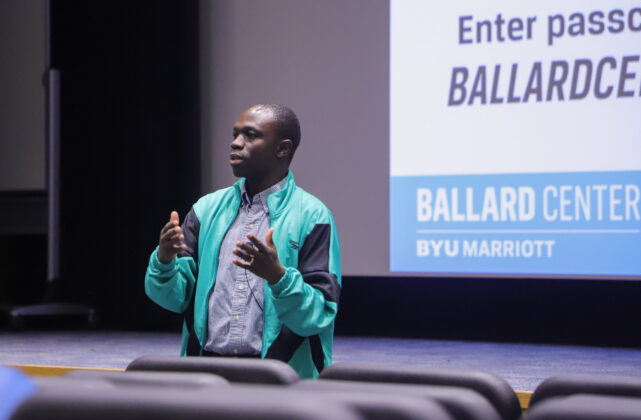BYU Peery Film Series, hosted by the Ballard Social Center, showcased the film ‘Human Flow’ by Ai Weiwei at the Wilkinson Center Varsity Theatre Nov. 9-11.
The film ‘Human Flow’ documented the story of refugees and guest discussion leader Leonard Bagalwa spoke to students about his story and answered questions from students.
According to their website, each Peery Film is designed to educate students on social problems and create an opportunity to ask questions on underlying factors and consequences.
After each film, professional experts who were invited lead discussions and answer questions to educate and inform viewers on said showcased societal problem.
Bagalwa, a native of the Democratic Republic of the Congo, is the founder and executive director of Utah Valley Refugees. He said students might think they can’t help refugees because they don’t have any money, but as long as they speak English, they can help.
He said cultural integration takes both sides, and he taught his refugee community it is important to understand the “do’s” and “don’t’s” before going to a different culture.
Bagalwa said both sides need to understand and love one another to break the cultural barrier. He said refugees must learn to get out of their own community and learn the language to be successful to get integrated to another community.
Although it’s been a challenge placing refugees in a home, Bagalwa said he has created a refugee family alliance program where their organization will take responsibility and help pay for the refugees rent.
He said most landlords are still hesitant to accept refugees, but is currently working with BYU public health students to formulate ways to educate landlords that refugees are equal and not illegal.

Laesgaw K’Chawtee, an international relation major from Thailand, said the showing of the Peery Film was very informative and hopes when students look at these films, they can see the human side of refugees and realize they are just like everyone else here and want the same experiences we enjoy.
“These films, I hope would teach the students to have an open eye, to see that that person whether they say refugee, has a deeper story behind that and that there’s also stories untouched,” K’Chawtee said.
K’Chawtee said something students can do to become more inclusive to refugees is befriending them. Students can become more educated, open-minded, and volunteer with non-governmental organizations and nonprofits that directly work with refugees.
He said “all it takes is one person that you know personally, and then all of a sudden the conflict as a whole matters to you.”
Cydne Baker, an event lead at the Ballard Social Impact Center, said the biggest thing they want students to learn from the Peery Film Series is that they get excited about solving and being a part of solving social problems. She said another goal of the films is to elicit empowerment in students so they have an idea of where to start and what they can do today.
“That’s what these discussions are about. It’s about teaching students the right way to solve social problems, whether that’s solving poverty, whether that’s helping refugees, whether that’s creating places of belonging,” said Baker.
Students can join the Ballard Social Impact Center at BYU to learn more about how they can become involved. They offer several immersive experiences to get involved like on campus internships, the Social Venture Academy, BYU Connect and BYU Brief.









